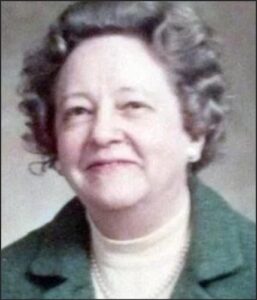by James A. Bacon
Frances Hazel Reid began working for the Loudoun Times-Mirror in 1921, and remained an employee until shortly before her death in 1994 at the age of 94. Starting out as a secretary in an era when the majority of women did not work outside the home, she rose through the ranks as reporter, treasurer and associate publisher. She founded the Loudoun Business and Professional Women’s Club, and was appointed director of the Loudoun County Historical Society in 1970. She was held in such high regard in her community that an elementary school in Leesburg was named after her in 2003.
Now she may be canceled.
Frances Hazel Reid Elementary School is one of nine schools in Loudoun being considered for a name change as part of the school board’s effort, in the words of the Times-Mirror, “to reckon with systemic racism in a county that didn’t integrate its schools until 1968.”
Reid’s sin: she was one of 14 women who founded the Purcellville chapter of the United Daughters of the Confederacy (DOC) in 1924.
Nationally, the UDC pursued two main goals: erecting memorials in honor of fathers and grandfathers who fought in the Civil War and caring for aging Confederate veterans and their families. Many revile the UDC today because its members perpetuated the “Lost Cause” interpretation of the Civil War.
According to Karen Cox, an historian of confederate monuments, “the UDC committed itself to vindicating the Confederate generation, both the men who fought and the women who supported the cause, through a broad-ranging agenda that included education, preserving pro-Confederate histories, various forms of public commemoration, and lobbying for Confederate homes for soldiers, widows, and their descendants.”
Imagine that. The UDC erected memorials to their fathers, uncles, grandfathers, and neighbors who fought in the war, and went so far as to lobby on their behalf.
Remember, the U.S. government paid pensions to Union veterans and their families — the largest item of expenditure by the federal government — which was funded by means of tariffs levied on the entire country. Those tariffs protected Northern industrial interests and penalized the exports of cotton, the most lucrative Southern commodity. Impoverished Southern states were left to their own devices to care for their aging veterans. Elderly Southern veterans turned to their communities for support.
Reid’s grandfather was a Confederate veteran.
Her views on the “Lost Cause” narrative are not reported by the Times-Mirror, which suggests that they are not known.
As for matters of race, Times-Mirror editor and co-worker Tim Farmer said that despite Loudoun’s “stained” history of racism, he “never saw her treat any person of color any differently than anyone else. She was always gracious and dignified with everyone she encountered.”
However, Reid remained a member of the UDC until 1927 at least, when Virginia was in thrall to Jim Crow, the Ku Klux Klan operated in Purcellville, and the Times-Mirror ran racist ads, as the modern-day Times-Mirror reminds us in its article.
Reid school parent Jessica LeBlanc said there’s no evidence that Reid supported the Lost Cause, racism or segregation. “If the Confederate cause or the Lost Cause was of any importance to her,” she said, “I think we would absolutely know about it because she was a journalist and had every platform that was available to her in the community to shout that from the mountaintops.”
The Loudoun school district and History Matters, a Richmond-based historical group hired to research the school names, will solicit public input about Reid and the propriety of naming a school after her.
The outcome of this process will be interesting. Will a woman of many accomplishments, who was on “the right side of history” in regard to women’s rights, be canceled because of guilt by association with the Daughters of the Confederacy, which in turn is deemed guilty of thought crimes?
We can reasonably infer that Reid was motivated to join the UDC at least in part by a desire to honor and care for aging veterans like her grandfather. We don’t know her early views on race; we don’t know if she voted for the segregationist Byrd machine. We don’t know her views about the Lost Cause, although we can say that she was never a vocal proponent of it. Conversely, we do have testimony that in later years she treated African Americans no differently from anyone else.
Unless research turns up evidence to the contrary, any case against Reid would be based on the conjecture that at one point in her life she might have held racist views and might have supported the Lost Cause narrative. It wouldn’t matter whether her views evolved. It wouldn’t matter what she contributed to the community or how she interacted with her fellow African American citizens. Canceling Reid on the basis of what we know now would be a travesty: a hateful act of retribution and cultural cleansing.
Hopefully, Loudoun County will not countenance such a thing.



